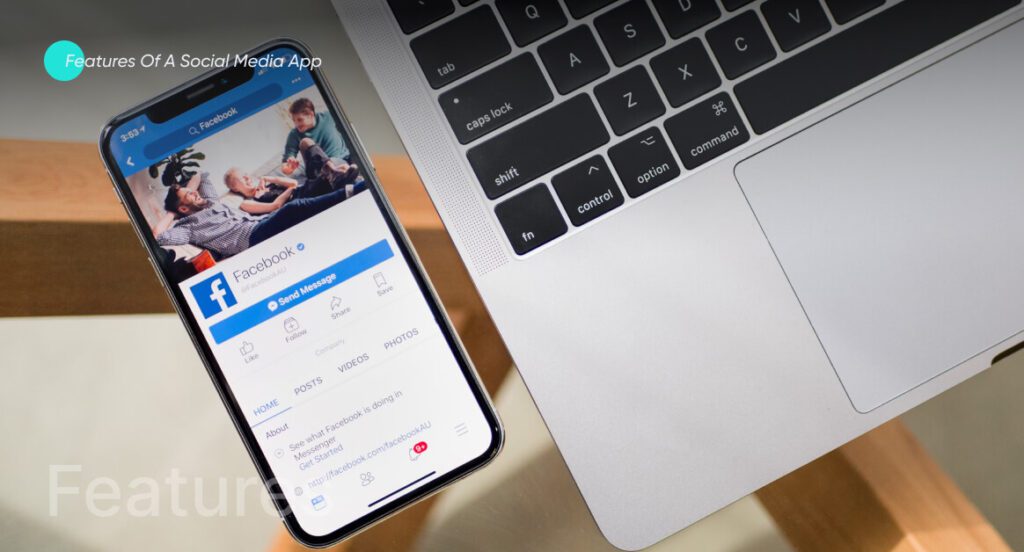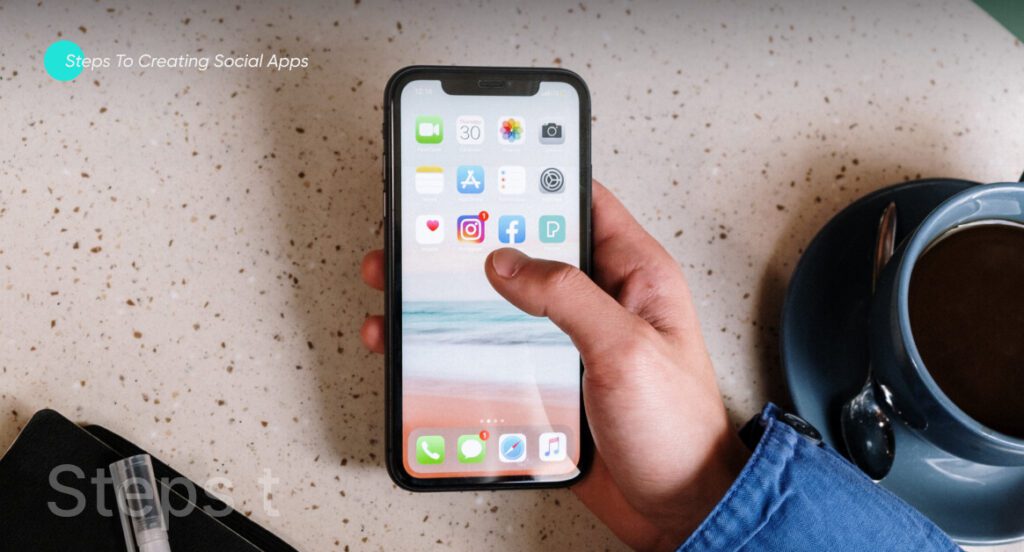Create a Social Media Application Like Facebook
The social media industry is growing rapidly, with Facebook as a market leader. It is projected to have $189.50 billion in revenue by 2027. With a user base of 3.049 billion, it captures more than half of the global social media user base. Due to its massive success, the desire to create an app like Facebook isn’t uncommon among entrepreneurs looking to tap into this industry. With hundreds of competitors, making a space for yourself and standing out requires a competitive advantage that outshines others. With the right idea and execution, you can turn this challenge into a lucrative opportunity.
If you want to create the next globally-recognized social network that outshines Facebook, read on. This blog will discuss the benefits of apps like Facebook, the app-building process, and the prominent features of social media applications. Let’s dive in!
Benefits of Social Network Apps Like Facebook

Seamless Social Connectivity
A social media application’s core value is ingrained in providing avenues for seamless social connectivity. Whether you’re developing an app for the public or looking to cater to a specific niche, a Facebook-like app offers a platform for connecting with others.
Your application becomes a virtual bridge for building personal and professional relationships. These relationships ultimately translate to a vibrant and interconnected community.
Increase Traffic and Boost SEO
An app like Facebook catalyzes users to create and share content amongst themselves. The innate value of user-generated content is much higher than the value of paid branded content because of the organic element attached to it and the loyal user traffic it attracts to the application.
This user-generated content extends to SEO and branding activities, strengthening your online presence. It ultimately helps increase search visibility, improve SERP rankings, develop a positive brand image, and increase conversions.
Gathering Data Insights
Data has become an invaluable asset today, and apps like Facebook are pivotal in encouraging users to share their information. This includes geographic and demographic details, personal preferences, and much more. This empowers businesses to enhance their understanding of consumer behavior and purchase trends. Businesses can pursue operational efficiency, innovation, and growth through your platform and, in return, can improve your standing in the social networking market.
Revenue Potential
Today, businesses leverage social media marketing channels for brand building. Facebook is a market leader in providing a platform for brands to market their products to their target audience. Facebook’s revenue model heavily relies on advertising. Entrepreneurs can learn from this and use targeted ads to achieve financial success.
Features of A Social Media App

Adding these features is the bare minimum and is essential if you want to create an app like Facebook.
User Interface
User Interface (UI) is the first thing you should consider during the Ideation process. The app’s UI is essential because it incorporates input controls, navigation, content, media, etc. Regardless of your target audience, your app should be easy and simple to navigate.
Aesthetically Pleasing Design
Social media apps must have a visually appealing, consistent design with a proper color palette and font to engage their target audience.
See our latest relevant exploration How To Create A social media app design
![]()
Safe Login
Social media apps require users to provide sensitive information. Securing user data is crucial to prevent identity theft and malware attacks. For a safe user experience, we recommend multiple verification methods for logging in, such as code authentication and backup email.
Networking Element
If you want to create an app like Facebook, it should facilitate the creation of a personal and professional network for each user. Users should be free to add friends, family, colleagues, or others to their social accounts. They should be able to add these people to their personal or professional network and follow each other.
Content Sharing
Social media users want to share aspects of their daily lives with their network. This helps them feel more connected with others and facilitates stronger relationships. This includes uploading and sharing photos, videos, GIFs, and other types of content. Therefore, content sharing should be effortless and user-friendly to ensure a seamless experience for the users.
Messaging Feature
Social media apps allow users to send public and private messages to each other, similar to content sharing. Many social media apps also enable users to participate in group chats and video calls.
Messaging services are not likely to affect the user’s data plans as long as they are connected to a Wi-Fi network. It is more convenient and economical to stay connected with others than going for expensive text messages or long-distance calls.
Notifications
Real-time notifications are essential social media features that inform users of recent updates. Users want to be notified when someone they follow posts something new or a business they follow has a sale.
Additionally, it’s crucial to alert users about significant events happening in the news. Therefore, it’s highly recommended to include these features in your app.
Privacy Settings
Social media users have different preferences when it comes to sharing their information. Some users like to keep their content private and share it only with people they know, while others are comfortable sharing it publicly.
One of the main features of social media apps is the ability to control privacy settings. Your app should let users choose who can view their profiles, determine how much of their information is shared, and allow them to opt out of specific marketing campaigns.
Steps to Creating an App Like Facebook

So, how can you create an app like Facebook? Creating a successful social media app is expensive, and there’s no one-size-fits-all approach to replicate Facebook’s success. Following these steps can help you save valuable resources and save you from the failure of creating an app that no one wants.
1. Don’t Dive Right Into Coding:
Coding will be the most significant investment in your app development project; hiring the right programmer requires a substantial chunk of money. Hence, only approach this step once you know what you want and how you like it. Be accurate and precise.
We recommend diving into coding when you know these things:
- How do you want your app to look?
- How do you want the app to feel?
- What features do you want to add?
2. Defining Your Vision
Creating an app like Facebook requires extensive market research, competitor analysis, and targeted audience research. After researching, make a cohesive list of your strategic goals and define your vision for the app. Discuss your vision and goals with your key stakeholders and address questions like:
- How will my app stand out in the industry?
- What is my app’s unique selling point (USP)?
- What is the opportunity gap that my app is addressing?
- How can I capture my target audience?
These questions will help you draw a practical road map, and you can allocate the right resources to your project with moderated risk.
3. List Essential Features
You must list key features to add to your social media application. Creating an app like Facebook requires defining features like media sharing, messaging, security, privacy, etc. We’ll discuss these features in more detail in the next section to provide further clarity.
4. Design the App
App design is crucial for creating an engaging and user-friendly application. Hence, follow principles of clarity, flexibility, consistency, and feedback for a seamless user experience.
Design your landing page well, as it is your first impression and a brief advertisement of your app’s benefits. Use insights from your target audience to define your value proposition and promote your business.
5. Frontend Development
Every application’s appeal is influenced by its functional aesthetics. The success of an application is directly proportional to its simplicity and ease of use in both the short and long term. You can choose between a web-based solution and a native application.
Native apps are OS-specific and use platform hardware for optimal user experience. They are independent of online connection and have an aesthetically pleasing interface. Web-based solutions have a lower cost and fast development rate but restricted functionality.
6. Backend Development
The backend of your app is crucial for its survival. It involves forming business rules, building APIs, and handling information. You can hire developers, build from scratch, or use Backend-as-a-Service.
7. QA Testing
This step is centered around defining standards, checking the product quality, and suggesting any areas of improvement. This Quality Assurance (QA) process usually happens simultaneously with the coding process, ensuring all system bugs are removed. It ultimately contributes to increased system integrity as well.
8. Create An Analytics Dashboard
App analytics provide crucial insights into user behavior and help optimize your app. It tracks key metrics like downloads, revenue, and active users, keeping you updated on your progress. Use this data to enhance existing features and introduce new ones as needed.
9. Deployment and Launching
After your application is developed and tested, the next step is to get it deployed and launched. You must pay special attention to the legal aspects of app development before launching it. Moreover, hire trusted specialists to draft a privacy policy and terms of use for your application.
To register your application, add some images of the UI, upload app metadata, add an APK file, and add an engaging description. You might have to wait several days before your app is recognized as a new item.
Consider Coding Pixel, Your Trusted Partner in Mobile App Development
We have discussed how you can create your own social network, like Facebook, to facilitate your app development journey. However, despite this comprehensive discussion, building a social media app has a lot of technical challenges attached to it; without an expert on board, you can miss out on valuable opportunities.
At Coding Pixel, with over 8 years of experience and 100+ app development projects, we have the expertise to help you stand out and deal with technical challenges. We understand the complexity of the ever-evolving social media landscape. Our seasoned developers are your partners in creating innovative solutions customized to your brand to boost engagement and make a global impact.
Feel free to contact Coding Pixel, See our Social App Development Service </b ![]()
Final Thoughts
When developing social media apps, it’s essential to approach the task with care and attention to detail. The benefits of creating a platform that enables seamless connectivity and has the potential to generate revenue are enormous, but it’s essential to take things step-by-step. Conducting thorough research, having a clear vision, incorporating essential features, and designing with the user in mind are all critical components of success.
It’s crucial that the interface is easy to use and secure and that essential features like content sharing and messaging are included. By embracing innovation and strategic planning, entrepreneurs can carve out a niche in the thriving social media industry. Ultimately, the goal is to provide users with an unparalleled experience that exceeds their expectations.
FAQ
The timeframe for creating an application like Facebook entirely depends on the complexity of the features incorporated in your application. However, building a social media app generally takes 3 to 4 months.
Creating an app like Facebook is possible, but it is a complex task requiring expertise in programming languages, software design, and database management. It is unlikely that someone without app development experience can create an app like Facebook and build it without practice.
Yes, you can monetize your app. Monetizing your social media app can be done through affiliate marketing, sponsorships, advertisements, and brand partnerships, among other avenues.
Gohar is a seasoned IT writer specializing in leading technologies. He holds a Diploma and Bachelor's degree from the University of London, with professional experience spanning over five years in the IT sector. His expertise involves a keen focus on mobile applications, web apps, blockchain, content management systems, e-commerce, and fintech. Beyond the professional field, Gohar is an avid reader and reads extensively about emerging and innovative technologies.